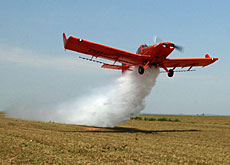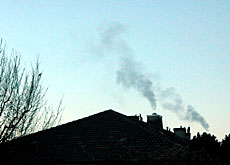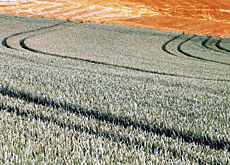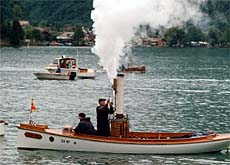States seek better antidote to industrial poisons

Ministers and officials from over 100 countries are meeting in Geneva this week for a high-level conference on the import and export of hazardous chemicals.
Pesticides and industrial chemicals have poisoned millions of people in recent decades and killed tens of thousands, according to the United Nations.
“Every human being on Earth carries in his or her body traces of various hazardous chemicals, many of which have been linked to cancer, birth defects and other health problems,” the UN’s Environment Programme (UNEP) said in a statement.
The five-day meeting, which begins on Monday, is being chaired by the head of the Swiss environment agency, Philippe Roch.
It marks the debut of the so-called Rotterdam Convention, which aims to reduce the health and environmental risks of hazardous chemicals by regulating the import and export of such products – especially in developing nations.
“Increasing human and environmental security is one of the most important anticipated outcomes of this convention,” Roch told swissinfo.
Toxicity
“It will also give underdeveloped countries an effective tool to judge the toxicity of the products they sell and to better control the import of certain products,” Roch added.
Some 70,000 different chemicals are available on the market today and around 1,500 new ones are introduced every year, making it difficult for many countries to monitor and manage potentially dangerous substances.
According to the UNEP, many pesticides that have been banned or severely restricted in industrialised countries are still marketed and used in developing nations.
Roch said he hoped the Rotterdam Convention would provide a means to better protect people living in rural areas by “helping countries learn from each other and increase their understanding of the risks of hazardous chemicals”.
First line of defence
The UNEP blames accidents, misuse and inadequate controls of hazardous chemicals for poisoning millions of people and the agency hopes the treaty will provide a “first line of defence” for human health and the environment.
“The winners created by this new convention will range from subsistence farmers to nursing mothers to wildlife,” said the UNEP’s executive director, Klaus Töpfer.
“Another beneficiary will be the ambitious agenda for sustainable development and poverty alleviation set out two years ago this month in Johannesburg by the World Summit on Sustainable Development,” he added.
Under the provisions of the convention, authorisation to export the most hazardous chemical pesticides and products will no longer be granted unless the importing country gives its prior informed consent (PIC).
At present, 22 pesticides and five chemical products are subject to the PIC procedures, including the insecticide, DDT, and highly toxic mercury compounds.
Roch said one of the aims of this week’s conference was to add 15 new substances to the “watch list” as well as to define ways to ensure the convention’s long-term effectiveness.
Swiss role
The decision on the site of the permanent Secretariat of the Convention is also expected to be taken at the end of the conference.
Geneva and the Italian capital, Rome, have managed the secretariat together since 1998 and have submitted a joint candidature for the permanent seat. They are up against the German city of Bonn.
Both the Swiss and Italian governments argue that a vote in their favour would underscore the international community’s desire to achieve greater coherence and synergy when it comes to international agreements.
“The experience of the past five years has show that the dual seat of the secretariat is a workable and effective solution,” the Swiss environment agency said in a statement.
“This is a very important decision for Switzerland,” Roch added.
swissinfo, Anna Nelson in Geneva
The Rotterdam Convention applies to chemical products that are banned or severely restricted as well as to extremely hazardous pesticides.
There are 22 pesticides and industrial chemicals on the Convention’s watch list.
These include the insecticide, DDT, and highly toxic mercury compounds.
At least 14 more substances are expected to be added to the list during the conference.
Nearly 450 delegates from more than 100 countries are taking part in a five-day conference on hazardous chemicals in Geneva.
The meeting marks the debut of the Rotterdam Convention, which aims to improve human and environmental security by reducing the risks of industrial chemicals and pesticides.
Participants are also expected to decide whether Geneva and Rome will share the permanent seat of the Convention or whether it will be moved to Bonn.

In compliance with the JTI standards
More: SWI swissinfo.ch certified by the Journalism Trust Initiative



You can find an overview of ongoing debates with our journalists here. Please join us!
If you want to start a conversation about a topic raised in this article or want to report factual errors, email us at english@swissinfo.ch.